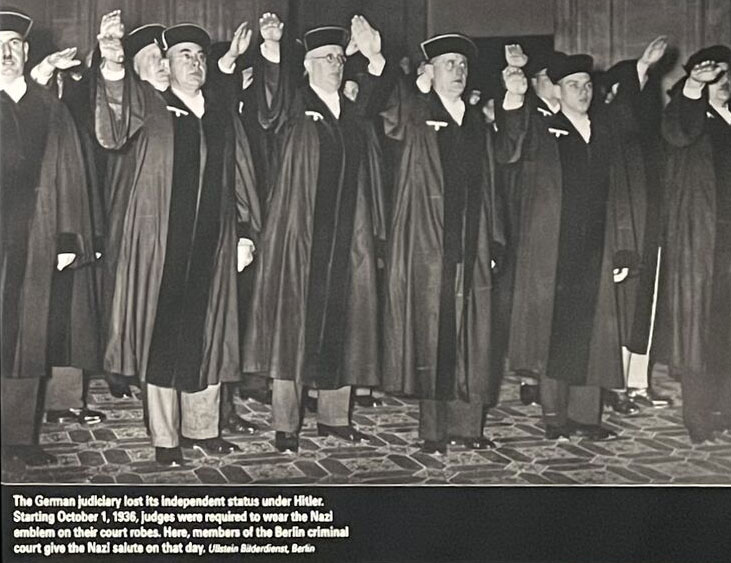|
The Nazis Did Great Things... and So Might Trump
By  - 4/5/2025 - 4/5/2025

Like most Americans, I heard a lot about the Nazis and the Communists while growing up. The Nazis in particular were always portrayed as the absolute embodiment of evil. Almost the only thing I was ever taught about the Nazis was that they were horrible people who did horrible things. They promoted division, they eliminated free speech, they implemented eugenic programs that sterilized certain groups of people, they imprisoned and killed millions of people from groups they didn't like, such as Jews, homosexuals, atheists, gypsies, and political opponents, etc.
But what I wasn't taught, and didn't learn until I started doing my own research, was how many good things the Nazis and other dictators did. And it wasn't until I learned about all of the good things that Nazis and other brutal regimes did, that I was able to really understand these movements.
As Americans I think we have done a major disservice to ourselves by over-emphasizing the worst aspects of authoritarian regimes and not painting a more complete picture of life under authoritarian rule. The result, I believe, is that the vast majority of Americans have a very cartoonish concept of what authoritarianism looks like. I think that many people have the impression that dictators are completely brutal and thoroughly terrible to everyone all the time, and that everyone living under these regimes was living in constant fear and desperation. As a result, when people see leaders who do some things that they approve of, they may conclude that such leaders aren't really dictators or that their leadership isn't really so bad.
The reality is that Benito Mussolini, Adolph Hitler, Joseph Stalin, Mao Zedong, and countless other dictators of the 20th century, were widely popular. These people had huge support from the public and were loved by millions. They implemented programs that benefited millions of people and improved the lives of majorities of people in their countries, at least for periods of time. You cannot understand why their regimes were able to stay in power and do what they did unless you understand the great things that they accomplished and the ways that they improved the lives of so many people.
A major flaw in the way that we have tended to portray such regimes in America is that we have focused so heavily on exposing the worst aspects of these regimes that we have created a false impression of how these regimes stayed in power and why they were able to do what they did. The Nazis were able to round up millions of innocent people, torture and kill them, and launch Germany into an ill-fated war that would bring the county to ruin, because they implemented programs that improved the lives of the majority of Germans.
But despite the fact that many authoritarian regimes are able to bring about short-term improvements, they often also bring about long-term oppression and suffering. Authoritarian regimes are able to implement rapid changes at the direction of an individual or small group of people instead of working through consensus, but they also foster corruption and ineptitude. This is because authoritarian regimes necessarily lack transparency and eliminate the ability to question or challenge their decisions. Any time individuals are shielded from consequences, corruption and abuse of power follows. In many ways, the single most important factor in promoting any healthy organization is accountability. The first action of authoritarian regimes is to attack and remove all aspects of accountability.
Nevertheless, it must be recognized that the way authoritarian regimes typically consolidate their power is by solidifying public support through the implementation of popular programs. So let's start by looking as some of the positive and popular achievement of the Nazis.
Achievements and popularity of the Nazis
When the Nazis came to power in 1933 the unemployment rate in Germany was around 30%. Under the leadership of Adolph Hitler, the Nazis implemented a number of economic policies that dramatically reduced unemployment. This was achieved in a number of ways. The Nazis engaged in significant deficit spending through elaborate financing schemes. Such elaborate schemes were necessary because Germany still suffered from poor credit and a hobbled financial system as a result of World War One. But the Nazis were able to use debt to finance a tremendous amount of public works, which provided numerous jobs. In addition, the Nazis also removed many people from the workforce, namely women and various minority groups such as Jews. Women were effectively removed from the workforce as they were paid to be stay-at-home-mothers. Regulations were also put in place that limited the employment of women. It should be noted, however, that the paying of women to raise families was viewed as a progressive policy that recognized the contributions of mothers to society and was highly popular.
The Nazis also put in place a number of economic regulations that protected German markets from foreign competition. Under Nazi leadership the Germans began producing advanced goods, such as aircraft, electronics and automobiles, initially for export to foreign markets. This allowed the Germans to develop advanced industries and use the sales of these products to finance the economic growth.
The building of public works produced tangible results that citizens could see and benefit from. Public works built by the Nazis included schools, hospitals, roads, and stadiums, such as the 1936 Olympic Stadium.
As the economy rapidly improved, the Nazis also implemented a number of popular social programs. The Nazis implemented a retirement system like Social Security, which provided a guaranteed income for the elderly. This was, in fact, one of the first such national programs of its kind. The Nazis also implemented a program known as "Strength through Joy", which provided recreational and leisure activities for workers at little or no cost. These programs were also extremely popular.

Germans at a Nazi resort beach
Through the Strength through Joy program workers were provided with everything from small benefits, like free visits to theaters, to much larger rewards like fully paid cruises and vacations to resorts. These activities were also, of course, heavily infused with Nazi propaganda and always included effusive praise for Adolph Hitler.
Attaining power and control
While the Nazis did materially improve the lives of millions of Germans for a period of time, they also undermined the legal system and consolidated control of every aspect of German society. Before the Nazis came to power, Germany was a democratic republic. Indeed, prior to the rise of Hitler, Germany was one of the most democratic countries in the world, with a strong constitutional framework and deep traditions of free press and free speech. From the time of Martin Luther and the Protestant Reformation, the Germans had established themselves as leaders of freethought and free expression. The German political system was believed to be robust and not susceptible to authoritarian takeover.
The Nazis were able to come to power because they won the most seats in the German parliament, but no party had full majority. This meant that a coalition government would need to be formed. Through a series of parliamentary procedures, bargaining, threats and inside deals, the Nazi party was able to secure Hitler's position as Chancelor without forming a coalition government. Once becoming Chancellor, Hitler invoked a number of emergency powers in response to various events such as the Reichstag fire. These (supposedly temporary) emergency powers granted Hitler authority to act without parliamentary approval, and indeed even in ways that were not normally allowed by the German constitution.
Hitler used various emergency powers to then chip away at the legal system, eliminate political rivals, and reshape the government. A key part of Hitler's legal takeover of the German government was passage of the Enabling Act in 1933. The Enabling Act was essentially an amendment to the German constitution that granted all law-making authority to the Chancellor. The act required a two-thirds majority vote from the parliament, which the Nazis were able to secure through a combination of bargains, threats, and promises to various members of the parliament. So, importantly, the German parliament legally abdicated their power and handed full control of the government to Hitler. The powers granted to the Chancelor were meant to be temporary, but they were so broad that Hitler was able to use his temporary authority to legally grant himself permanent authority.
Key to the Nazi takeover was their attack on the judiciary. Prior to the Nazi takeover, Germany had a robust legal system with an independent judiciary. A primary focus for the Nazis was purging the judiciary of independent judges. Judges that did not join the Nazi Party were removed from office and replaced by judges who were members of the Nazi party. Once the judiciary had been sufficiently cleansed, the entire legal system of Germany became merely an expression of Hitler's will. Whatever Hitler approved of was legal and whatever he disapproved of was illegal. This was expressed with the motto, "Whatever is good for Germany is legal."

Lessons for today
The Trump administration is currently following a playbook used by numerous authoritarians to take down democracies and establish authoritarian states. Whether we are talking about Mussolini, Hitler, Stalin, Mao, or more recent authoritarians like Putin, they all implemented a very similar set of steps when they came to power. They all purged the government of existing employees, invoked emergency powers, attacked the judiciary, and used populist rhetoric to frame their actions as necessary to fight against corruption in the existing government bureaucracy. They all attacked those who questioned or disagreed with them as horrible, unpatriotic people.
But make no mistake, they were all popular and they all had the support of very large portions of the population. They were also able to deliver on providing real benefits for large portions of the population, at least for some period of time. Understanding this is highly important.
Yes, the Trump administration has gotten off to a rocky start. Trump has implemented a number of highly unpopular policies. Indeed, the biggest mistake of the Trump administration has been moving too fast and being too disruptive. Most authoritarians work to secure their support first by taking actions that are widely popular. These can often include "giveaways", the implementation of popular programs financed by debt, or large tax breaks. Cracking down to crime and making a spectacle of blatant criminals is another popular tactic, which Trump has attempted.
But the real point is that opposition to the Trump administration cannot be contingent upon his unpopularity. Yes, Donald Trump has created an opening for his opponents by doing things that are unpopular, but we should not at all assume that he will simply allow his popularity to continue to slide. There are many actions he can take to boost his popularity, and we should expect that he will do so.
The recent implementation of tariffs has created a huge rift, which may very well be Trump's undoing. But don't bet on it. There are still many things Trump and the Republicans can do. A lot can be done to provide short term economic stimulus, such as the implementation of huge tax cuts, massive deregulation, direct economic infusion of capital, crypto currency manipulation (which Trump likes because it is beyond the control of the Federal Reserve), and a host of other options. If Trump is able to get something passed that can provide a boost to the economy, he could very well see his popularity soar. The real test is being prepared for that.
What's even more troubling is the complicity of congressional Republicans. Congressional Republicans essentially served up the United States of America on a platter and have been prepared to allow Donald Trump to become a dictator and eliminate the rule of law in this country. It appears only now that they might be pulling back, but only because of Trump's incompetence. There should be no doubt that if Trump is popular the congressional Republicans are ready, willing, and able to effectively abolish the Constitution and hand full control of the government over to him. The vast majority of them are on-board with the plan of using Trump as a means to essentially enshrine one-party rule in the United States. That is, ultimately, the agenda - the establishment of an effective one-party system.
Voting rights and one-party rule
The Republicans want a judiciary that is fully populated by Republicans. They want control over US media. They want an electoral system that is heavily biased toward the Republican demographic. This is the real danger. There should be no doubt at all that the Trump administration, with the support of congressional Republicans, will do everything possible to hold onto power. They will absolutely work to bias the electoral system in their favor. Talk about "winning back congress" in the mid-term elections in 2026 is very naïve. Republicans fared poorly in the recent special elections because they haven't had time to revise voting rules, but there should be no doubt that by 2026 they will have significantly changed the electoral system in America.
What the Trump administration is doing right now, with the help of congressional Republicans, is absolutely criminal and disastrous. They are already all in. Virtually every congressional Republican has cast their lot with Trump. So at this point they know that they all sink or swim together. The vast majority of them are going to do whatever it takes to remain in power. This does not require putting a complete and official end to democracy in America, all it requires is packing the judiciary with Republican judges and revising voting rules to tip the scales in favor of Republicans.
The future of the country will likely be determined over the next few weeks and months. This will be a turning point in which the congressional Republicans either decide to stick with Trump or turn on him. If they stick with Trump, then they will work to change voting rights in America and they will do whatever it takes to stay in power. If they turn on him now, while they still have a chance to save face, then perhaps there will be a reasonable path out of the current disaster. But either way, the Trump administration and the Republicans aren't just going to sit idly by and watch America implode. They will work to pull some kind of rabbit out of the hat; and if they do, support for Trump will likely increase.
Conclusion
Up to this point the Trump administration has done very little to gain popularity with the public. This is actually unusual for authoritarian leaders, especially early in their administrations while they are still trying to consolidate power. This appears to be a critical error on the part of the Trump administration that has provided an opportunity to challenge Trump's leadership and perhaps put a stop to a complete takeover by the Republican party. But it would be extremely foolish and naïve to think that the Trump administration won't engage in actions to boost its popularity.
Opponents of the Trump administration must be able to articulate how positive accomplishments cannot compensate for harmful actions.
Authoritarians like Trump are extremely adept at garnering public support. Protesting against Trump while he is unpopular is relatively easy and should be exploited as extensively as possible. But there is a significant possibility that Trump will be able to achieve some real successes and that he will be able to rally support. The real challenge will be continuing to resist the Trump administration even if it becomes unpopular to do so.
|